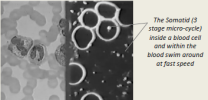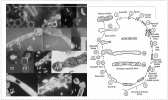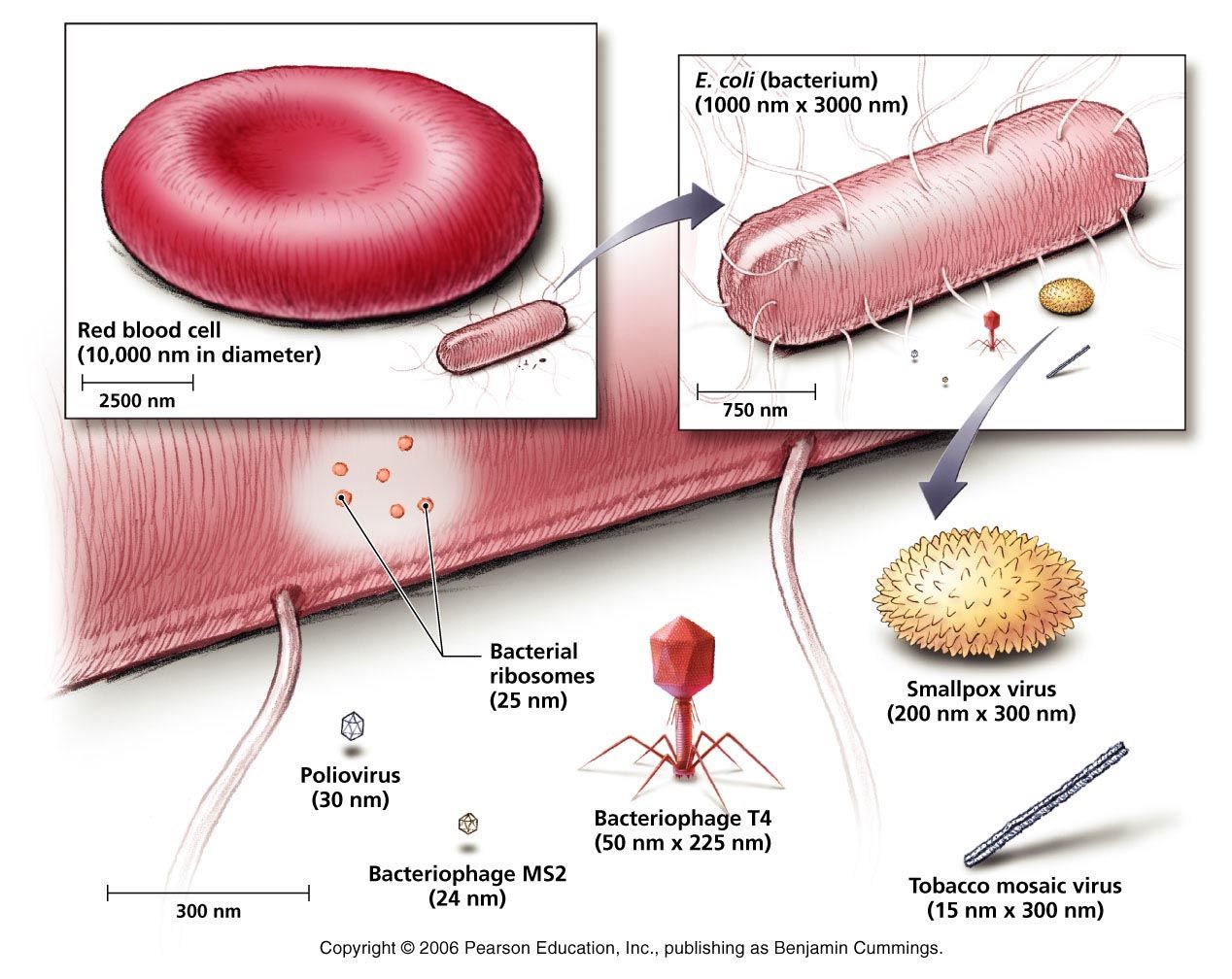Mandatory Intellectomy
Jedi Master
In simple terms, the Germ Theory states that disease comes from germs. The Terrain Theory states that germs are the result of a disease, not the cause.
The creature credited with giving us the germ theory is Louis Pasteur (1822-1895). He mainly stole ideas from others, and his real contribution was perverting those ideas and coming up with a result that has caused untold damage since. The germ theory is largely responsible for the barbaric idea of vaccination, for Big Pharma, and generally for people being a lot sicker than they need to.
A fascinating part of our hidden history is the one about the alternative to germ theory. It says that what matters for forming a disease is not the germs but the terrain, i.e. our bodies' immune system. These ideas were formed primarily by these three men:
Jacques Antoine Béchamp, 1816-1908
Royal Raymond Rife, 1888-1971
Gaston Naessens, 1924-
What they had in common is that all three invented and built microscopes (independently on one another) that were far superior not only to anything existing at that time, but also to anything available today. Our modern electron microscopes are inferior to these, both in resolution and in the way they work. Electron microscopes damage the samples by the way the samples are stained. Bechamp and the others built light microscopes that didn't damage the samples and had higher resolution, and so they were able to see things our scientists today can not see.
It is mind-boggling that these aren't mass-produced, given their very clear superiority. But as we know from our lessons from Darwinism, the elite's agenda is more important than progress, truth, or science, so we're stuck with mind-boggling stupidity in many areas.
What was seen under these microscopes were microbiological entities that appeared to be omnipresent in our cells and undergoing transformations that allowed them to perform different tasks. This is where the term 'pleomorphism' comes from - these entities change shape, as well as function. Germ theory is rigid, denies any transformation, and claims that a specific germ is responsible for a specific disease. The fact that many people have the germ and not the disease and many others have the disease but not the germ doesn't seem to disturb adherents of the germ theory any more than all the contradictions of Darwinism disturb evolutionists.
I have only started studying this, but I'm already getting flashbacks of my study of Darwinism, due to the contradictions and often wilful ignorance involved.
What's interesting is that the terrain theory and the people involved in it have been pretty much erased from history, despite their immense success with healing people including cancer patients and more.
The difference between Pasteur and Bechamp is strongly reminiscent of the difference between Edison and Tesla. Tesla and Bechamp were honest scientists, the real geniuses, who cared about the truth and about other people. Edison and Pasteur were charlatans who only cared about money and furthering agendas of the elites. Another parallel may be seen in Fauci vs Mikovits. This alone should give one a clue about where the truth is likely to be found.
Here's some essential literature on the topic:
Béchamp or Pasteur - A Lost Chapter in the History of Biology, by Ethel Hume.
The Persecution and Trial of Gaston Naessens, by Christopher Bird. This can be downloaded in several formats from here.
The Cancer Cure That Worked, by Barry Lynes.
Good-Bye Germ Theory: Ending a Century of Medical Fraud, by Dr. William P. Trebing. This is a new book, largely focusing on vaccination and how to avoid it.
Exposing the Myth of the Germ Theory - Arthur M. Baker. This is a ten-page paper and a good introduction into the topic. It can be downloaded here: https://mednat.news/ExposingTheMythOfTheGermTheory.pdf
The Blood and its Third Anatomical Element, by Antoine Bechamp. You can find the book online here.
Some more material on Germ Theory - Pleomorphism
This contains information about the theory as well as the people associated with it, including Wilhelm Reich (1897-1957).
For some introduction, you can also check Ketone Cop's post in the Corona thread:

 cassiopaea.org
cassiopaea.org
Another interesting character that has popped up is nurse Florence Nightingale (1820-1910). I don't know much about her yet, but from some excerpts I've read it seems she had some interesting things to say on this topic. She wrote a few books, including Notes on Hospitals and Notes on Nursing. I have them but haven't had time to check them yet.
You can watch a good introductory video here: Pleomorphism Proves Vaccine + Antibiotic Fraud, by Amandha Dawn Vollmer
A longer interview (over 2 hours) with Amandha on the topic can be found here: Terrain Theory with Yummy Mummy
And I'll add a third one which is 3 hours long and is a collection of several things (a lecture, an interview with Andrew Kaufman, and more)
 Viruses Germ Theory Exposed By Doctors - What Big Pharma And Mainstream News Won't Teach You
Viruses Germ Theory Exposed By Doctors - What Big Pharma And Mainstream News Won't Teach You
Not necessarily everything in those videos is correct, and there are some controversional statements here and there, but I guess we're here to figure out what's what.
Sometimes these people say that 'there are no viruses', which is an unfortunate use of words, but as far as I can tell, the mistake is not so much in knowledge but in formulation, so look beyond that and see it in the wider context of what these people are saying. The message is more along the lines of 'viruses are not what we've been told they are', which I think is correct. We know little about viruses, and given various remarks by the Cs, viruses might be a lot more important than we imagine, so there's much to explore there.
There are questions about whether viruses have really ever been properly isolated and what evidence there is that they do what we're told they do. All images of viruses seem to be "artists' renditions", not actual photos. Has anyone seen any real evidence of this new coronavirus? What do we really have? Some DNA sequence, but what is it? What does it do? How does it 'operate'? A virus has no metabolism, no means of moving. It's basically a chunk of DNA, so the idea that it 'invades' you and does all kinds of things to make you sick is built on a rather shaky ground.
Germs in general are scavengers. They eat dead cells. So when you're sick, which is usually caused by some kind of toxicity or other damage, the microbes eat the dead cells resulting from the damage. They clean the terrain from waste. They're not harmful, and they don't 'cause' the damage. And they don't kill cells. If they could do that, then with the rate at which they multiply we would never survive. They'd just literally eat us alive.
From a biological point of view, it makes no sense for an organism to 'cause' a disease in another organism. Organisms use other organisms for food. And microbes feed on dead cells. If you have dead cells, they eat them. If you don't, they have nothing to eat there. So healthy people won't get sick by ingesting or inhaling microbes because there's no food available for them.
The whole idea of disease is pretty twisted in our society. What's called disease is actually the healing process, including cancer. What we see as 'disease' is the body already dealing with some damage. We literally call the process of healing 'disease', at least in many cases. And by treating the 'symptoms', we're often destroying or slowing down the healing process, and our mainstream medicine doesn't even have a clue about the actual cause of the problems. We kind of have it all backwards.
Disease is caused largely by bad nutrition, toxicity, and stress. This is mostly ignored and not addressed by doctors. Once the toxicity kills cells, germs appear to eat them and clean things up. If you're relatively healthy and your immune system is functional, this takes care of things and you're fine again. But doctors see this process as the disease and the germs as the cause, and by giving you antibiotics, they're doing the opposite of what's needed. If your immune system is weak or the toxicity accumulates too fast, the germs can't clean things up fast enough and you get worse. But most medical treatment doesn't address the cause and tries to make the symptoms (which are part of the healing process) disappear. The whole paradigm doesn't make sense.
Now, antibiotics may be useful in some cases. If the symptoms are too bad, then antibiotics make the process of healing slower and milder, as opposed to fast and intense. Decreasing the intensity can be helpful if the body is too weak to deal with it. But in principle, the whole germ-based view is just wrong.
There are many questions, though, and one of them is contagion. How does that really work? I'm not entirely sure. The terrain theory says you can't 'catch' a disease, but I think you can still acquire bacteria and viruses from the outside, so we may have to filter out the terminology here. The main point is that 'catching' the bug and 'becoming sick' are two very different things. One does not imply the other. If you're healthy, with a good immune system, you can get HIV or whatever and not get sick. On the other hand, if you're daily destroying your immune system and the whole body, you'll get sick without acquiring anything you didn't have in the first place. Whatever bacteria or viruses you have are more or less likely to participate in feasting on the dead cells, but they have nothing to do with causing your sickness.
An interesting idea is that this contagion thing can be psychological. Like when one person yawns and others start yawning too, a sick person can trigger the healing process (called disease by doctors) in others around. Reading about this reminded me of Sheldrake's morphic resonance. I guess it would be hard to test this somehow, but it's quite possible that something like this works.
Anyway, I've only read very little about this so far, so this is just an introductory post into something that I think is pretty significant and would be good to explore more and understand properly.
The creature credited with giving us the germ theory is Louis Pasteur (1822-1895). He mainly stole ideas from others, and his real contribution was perverting those ideas and coming up with a result that has caused untold damage since. The germ theory is largely responsible for the barbaric idea of vaccination, for Big Pharma, and generally for people being a lot sicker than they need to.
A fascinating part of our hidden history is the one about the alternative to germ theory. It says that what matters for forming a disease is not the germs but the terrain, i.e. our bodies' immune system. These ideas were formed primarily by these three men:
Jacques Antoine Béchamp, 1816-1908
Royal Raymond Rife, 1888-1971
Gaston Naessens, 1924-
What they had in common is that all three invented and built microscopes (independently on one another) that were far superior not only to anything existing at that time, but also to anything available today. Our modern electron microscopes are inferior to these, both in resolution and in the way they work. Electron microscopes damage the samples by the way the samples are stained. Bechamp and the others built light microscopes that didn't damage the samples and had higher resolution, and so they were able to see things our scientists today can not see.
It is mind-boggling that these aren't mass-produced, given their very clear superiority. But as we know from our lessons from Darwinism, the elite's agenda is more important than progress, truth, or science, so we're stuck with mind-boggling stupidity in many areas.
What was seen under these microscopes were microbiological entities that appeared to be omnipresent in our cells and undergoing transformations that allowed them to perform different tasks. This is where the term 'pleomorphism' comes from - these entities change shape, as well as function. Germ theory is rigid, denies any transformation, and claims that a specific germ is responsible for a specific disease. The fact that many people have the germ and not the disease and many others have the disease but not the germ doesn't seem to disturb adherents of the germ theory any more than all the contradictions of Darwinism disturb evolutionists.
I have only started studying this, but I'm already getting flashbacks of my study of Darwinism, due to the contradictions and often wilful ignorance involved.
What's interesting is that the terrain theory and the people involved in it have been pretty much erased from history, despite their immense success with healing people including cancer patients and more.
The difference between Pasteur and Bechamp is strongly reminiscent of the difference between Edison and Tesla. Tesla and Bechamp were honest scientists, the real geniuses, who cared about the truth and about other people. Edison and Pasteur were charlatans who only cared about money and furthering agendas of the elites. Another parallel may be seen in Fauci vs Mikovits. This alone should give one a clue about where the truth is likely to be found.
Here's some essential literature on the topic:
Béchamp or Pasteur - A Lost Chapter in the History of Biology, by Ethel Hume.
The Persecution and Trial of Gaston Naessens, by Christopher Bird. This can be downloaded in several formats from here.
The Cancer Cure That Worked, by Barry Lynes.
Good-Bye Germ Theory: Ending a Century of Medical Fraud, by Dr. William P. Trebing. This is a new book, largely focusing on vaccination and how to avoid it.
Exposing the Myth of the Germ Theory - Arthur M. Baker. This is a ten-page paper and a good introduction into the topic. It can be downloaded here: https://mednat.news/ExposingTheMythOfTheGermTheory.pdf
The Blood and its Third Anatomical Element, by Antoine Bechamp. You can find the book online here.
Some more material on Germ Theory - Pleomorphism
This contains information about the theory as well as the people associated with it, including Wilhelm Reich (1897-1957).
For some introduction, you can also check Ketone Cop's post in the Corona thread:

Coronavirus Pandemic: Apocalypse Now! Or exaggerated scare story?
Whew! Just cruised through 115 pages of this colossus. Doing another cursory link summary here. I have some personal thoughts in parenthesis because I'm sharing this in places other than here and they need a little context for some things. Some of these links are also to posts within this thread...
Another interesting character that has popped up is nurse Florence Nightingale (1820-1910). I don't know much about her yet, but from some excerpts I've read it seems she had some interesting things to say on this topic. She wrote a few books, including Notes on Hospitals and Notes on Nursing. I have them but haven't had time to check them yet.
You can watch a good introductory video here: Pleomorphism Proves Vaccine + Antibiotic Fraud, by Amandha Dawn Vollmer
A longer interview (over 2 hours) with Amandha on the topic can be found here: Terrain Theory with Yummy Mummy
And I'll add a third one which is 3 hours long and is a collection of several things (a lecture, an interview with Andrew Kaufman, and more)

Not necessarily everything in those videos is correct, and there are some controversional statements here and there, but I guess we're here to figure out what's what.
Sometimes these people say that 'there are no viruses', which is an unfortunate use of words, but as far as I can tell, the mistake is not so much in knowledge but in formulation, so look beyond that and see it in the wider context of what these people are saying. The message is more along the lines of 'viruses are not what we've been told they are', which I think is correct. We know little about viruses, and given various remarks by the Cs, viruses might be a lot more important than we imagine, so there's much to explore there.
There are questions about whether viruses have really ever been properly isolated and what evidence there is that they do what we're told they do. All images of viruses seem to be "artists' renditions", not actual photos. Has anyone seen any real evidence of this new coronavirus? What do we really have? Some DNA sequence, but what is it? What does it do? How does it 'operate'? A virus has no metabolism, no means of moving. It's basically a chunk of DNA, so the idea that it 'invades' you and does all kinds of things to make you sick is built on a rather shaky ground.
Germs in general are scavengers. They eat dead cells. So when you're sick, which is usually caused by some kind of toxicity or other damage, the microbes eat the dead cells resulting from the damage. They clean the terrain from waste. They're not harmful, and they don't 'cause' the damage. And they don't kill cells. If they could do that, then with the rate at which they multiply we would never survive. They'd just literally eat us alive.
From a biological point of view, it makes no sense for an organism to 'cause' a disease in another organism. Organisms use other organisms for food. And microbes feed on dead cells. If you have dead cells, they eat them. If you don't, they have nothing to eat there. So healthy people won't get sick by ingesting or inhaling microbes because there's no food available for them.
The whole idea of disease is pretty twisted in our society. What's called disease is actually the healing process, including cancer. What we see as 'disease' is the body already dealing with some damage. We literally call the process of healing 'disease', at least in many cases. And by treating the 'symptoms', we're often destroying or slowing down the healing process, and our mainstream medicine doesn't even have a clue about the actual cause of the problems. We kind of have it all backwards.
Disease is caused largely by bad nutrition, toxicity, and stress. This is mostly ignored and not addressed by doctors. Once the toxicity kills cells, germs appear to eat them and clean things up. If you're relatively healthy and your immune system is functional, this takes care of things and you're fine again. But doctors see this process as the disease and the germs as the cause, and by giving you antibiotics, they're doing the opposite of what's needed. If your immune system is weak or the toxicity accumulates too fast, the germs can't clean things up fast enough and you get worse. But most medical treatment doesn't address the cause and tries to make the symptoms (which are part of the healing process) disappear. The whole paradigm doesn't make sense.
Now, antibiotics may be useful in some cases. If the symptoms are too bad, then antibiotics make the process of healing slower and milder, as opposed to fast and intense. Decreasing the intensity can be helpful if the body is too weak to deal with it. But in principle, the whole germ-based view is just wrong.
There are many questions, though, and one of them is contagion. How does that really work? I'm not entirely sure. The terrain theory says you can't 'catch' a disease, but I think you can still acquire bacteria and viruses from the outside, so we may have to filter out the terminology here. The main point is that 'catching' the bug and 'becoming sick' are two very different things. One does not imply the other. If you're healthy, with a good immune system, you can get HIV or whatever and not get sick. On the other hand, if you're daily destroying your immune system and the whole body, you'll get sick without acquiring anything you didn't have in the first place. Whatever bacteria or viruses you have are more or less likely to participate in feasting on the dead cells, but they have nothing to do with causing your sickness.
An interesting idea is that this contagion thing can be psychological. Like when one person yawns and others start yawning too, a sick person can trigger the healing process (called disease by doctors) in others around. Reading about this reminded me of Sheldrake's morphic resonance. I guess it would be hard to test this somehow, but it's quite possible that something like this works.
Anyway, I've only read very little about this so far, so this is just an introductory post into something that I think is pretty significant and would be good to explore more and understand properly.
Last edited by a moderator:





